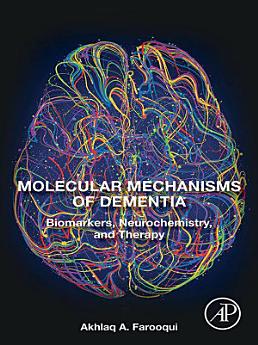Molecular Mechanisms of Dementia: Biomarkers, Neurochemistry, and Therapy
Apr 2019 · Academic Press
Ebook
386
Pages
family_home
Eligible
info
reportRatings and reviews aren’t verified Learn More
About this ebook
Considerable progress has been made in neurochemical and therapeutic aspects of dementia research in recent years. Molecular and Therapeutic Aspects of Dementia presents readers with comprehensive and cutting-edge information on the neurochemical mechanisms of various types of dementias. It provides a clearly written and logically organized and comprehensive overview of molecular aspects of risk factors, symptoms, pathogenesis, biomarkers, and therapeutic strategies for various types of dementia. This book is written for the international audience of neurochemists, neuroscientists, neurologists, neuropharmacologists, and clinicians. The hope is that this discussion will not only integrate and consolidate knowledge in this field, but will jumpstart more studies on molecular mechanisms and therapeutic aspects of dementia. The comprehensive information in this monograph may not only help in early detection of various types of dementia and dementia linked neurological disorders, but also promote discovery of new drugs, which may block or delay the onset of dementia in elderly patients. Understanding the course of dementia is important not only for patients, caregivers, and health professionals, but also for health policy-makers, who have to plan for national resources needed in the management of an increasing number of dementia cases. - Provides a comprehensive overview of molecular aspects of risk factors, symptoms, pathogenesis, biomarkers, and therapeutic strategies for various types of dementia - Summarizes cutting edge research information on signal transduction processes associated with neurochemistry of dementia - Discusses the synthesis, metabolism, and role of lipid mediators in dementia
About the author
Akhlaq A. Farooqui is a leader in the field of signal transduction processes, lipid mediators, phospholipases, glutamate neurotoxicity, and neurological disorders. He is a research scientist in the Department of Molecular and Cellular Biochemistry at The Ohio State University. He has published cutting edge research on the role of phospholipases A2 in signal transduction processes, generation and identification of lipid mediators during neurodegeneration by lipidomics. He has studied the involvement of glycerophospholipid, sphingolipid-, and cholesterol-derived lipid mediators in kainic acid neurotoxicity, an experimental model of neurodegenerative diseases. Akhlaq A. Farooqui has discovered the stimulation of plasmalogen- selective phospholipase A2 in brains of patients with Alzheimer disease (AD). Stimulation of this enzyme may not only be responsible for the deficiency of plasmalogens in neural membranes of AD patients, but also be related to the loss of synapse in the AD.
Rate this ebook
Tell us what you think.
Reading information
Smartphones and tablets
Install the Google Play Books app for Android and iPad/iPhone. It syncs automatically with your account and allows you to read online or offline wherever you are.
Laptops and computers
You can listen to audiobooks purchased on Google Play using your computer's web browser.
eReaders and other devices
To read on e-ink devices like Kobo eReaders, you'll need to download a file and transfer it to your device. Follow the detailed Help Center instructions to transfer the files to supported eReaders.







